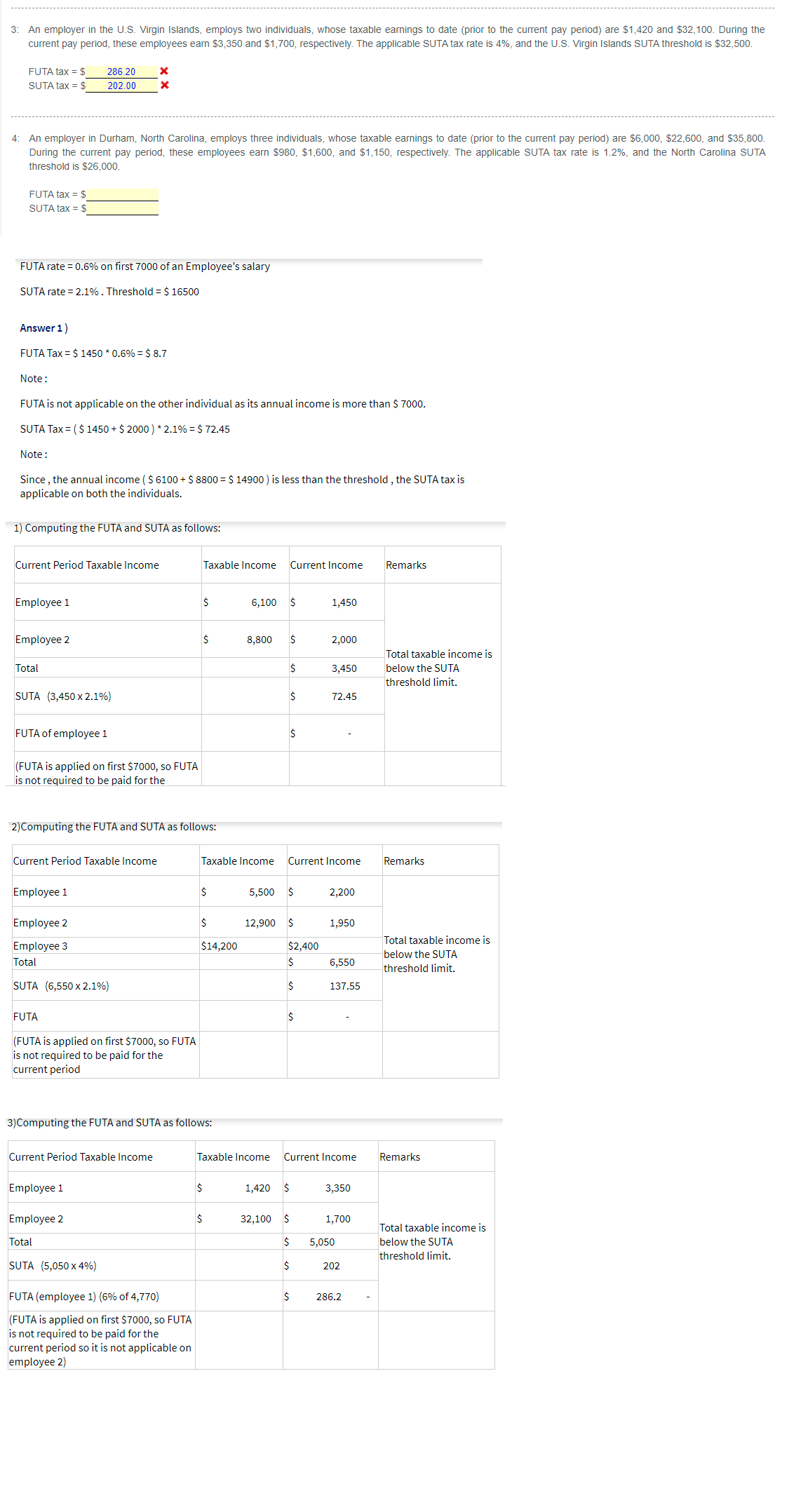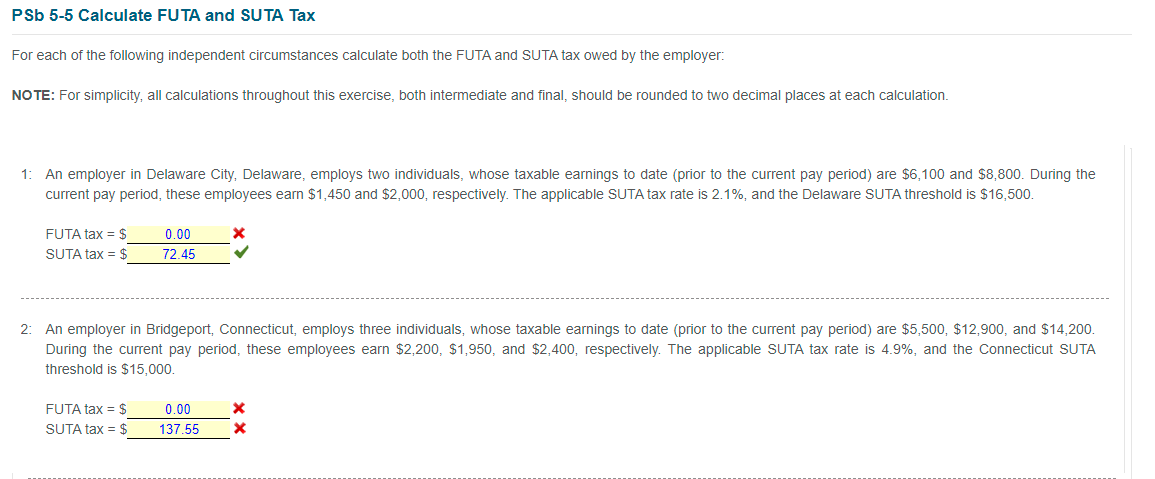3: An employer in the U.S. Virgin Islands, employs two individuals, whose taxable earnings to date (prior to the current pay period) are $1,420 and $32,100. During the current pay period, these employees ean $3,350 and $1,700, respectively. The applicable SUTA tax rate is 4%, and the U.S. Virgin Islands SUTA threshold is $32,500. FUTA tax = $ 286.20 SUTA tax = $ 202.00 4: An employer in Durham, North Carolina, employs three individuals, whose taxable earnings to date (prior to the current pay period) are $6,000, $22,600, and $35,800. During the current pay period, these employees earn $980, $1,600, and $1,150, respectively. The applicable SUTA tax rate is 1.2%, and the North Carolina SUTA threshold is $26,000. FUTA tax = $ SUTA tax = $ FUTA rate = 0.6% on first 7000 of an Employee's salary SUTA rate = 2.1%. Threshold = $ 16500 Answer 1) FUTA Tax = $ 1450 * 0.6% = $ 8.7 Note: FUTA is not applicable on the other individual as its annual income is more than $ 7000. SUTA Tax = ($ 1450 + $ 2000 ) * 2.1% = $ 72.45 Note: Since , the annual income ($ 6100 + $ 8800 = $ 14900) is less than the threshold , the SUTA tax is applicable on both the individuals. 1) Computing the FUTA and SUTA as follows: Current Period Taxable Income Taxable Income Current Income Remarks Employee 1 6,100 1,450 Employee 2 8,800 2,000 Total taxable income is Total 3,450 below the SUTA threshold limit. SUTA (3,450 x 2.1%) 72.45 FUTA of employee 1 (FUTA is applied on first $7000, so FUTA is not required to be paid for the 2)Computing the FUTA and SUTA as follows: Current Period Taxable Income Taxable Income Current Income Remarks Employee 1 5,500 2,200 Employee 2 12,900 $ 1,950 Total taxable income is Employee 3 $14,200 $2,400 below the SUTA Total 6,550 threshold limit. SUTA (6,550 x 2.1%) 137.55 FUTA (FUTA is applied on first $7000, so FUTA is not required to be paid for the current period 3)Computing the FUTA and SUTA as follows: Current Period Taxable Income Taxable Income Current Income Remarks Employee 1 1,420 3,350 Employee 2 32,100 $ 1,700 Total taxable income is Total 5,050 below the SUTA threshold limit. SUTA (5,050 x 4%) 202 FUTA (employee 1) (6% of 4,770) 286.2 (FUTA is applied on first $7000, so FUTA is not required to be paid for the current period so it is not applicable on employee 2)
3: An employer in the U.S. Virgin Islands, employs two individuals, whose taxable earnings to date (prior to the current pay period) are $1,420 and $32,100. During the current pay period, these employees ean $3,350 and $1,700, respectively. The applicable SUTA tax rate is 4%, and the U.S. Virgin Islands SUTA threshold is $32,500. FUTA tax = $ 286.20 SUTA tax = $ 202.00 4: An employer in Durham, North Carolina, employs three individuals, whose taxable earnings to date (prior to the current pay period) are $6,000, $22,600, and $35,800. During the current pay period, these employees earn $980, $1,600, and $1,150, respectively. The applicable SUTA tax rate is 1.2%, and the North Carolina SUTA threshold is $26,000. FUTA tax = $ SUTA tax = $ FUTA rate = 0.6% on first 7000 of an Employee's salary SUTA rate = 2.1%. Threshold = $ 16500 Answer 1) FUTA Tax = $ 1450 * 0.6% = $ 8.7 Note: FUTA is not applicable on the other individual as its annual income is more than $ 7000. SUTA Tax = ($ 1450 + $ 2000 ) * 2.1% = $ 72.45 Note: Since , the annual income ($ 6100 + $ 8800 = $ 14900) is less than the threshold , the SUTA tax is applicable on both the individuals. 1) Computing the FUTA and SUTA as follows: Current Period Taxable Income Taxable Income Current Income Remarks Employee 1 6,100 1,450 Employee 2 8,800 2,000 Total taxable income is Total 3,450 below the SUTA threshold limit. SUTA (3,450 x 2.1%) 72.45 FUTA of employee 1 (FUTA is applied on first $7000, so FUTA is not required to be paid for the 2)Computing the FUTA and SUTA as follows: Current Period Taxable Income Taxable Income Current Income Remarks Employee 1 5,500 2,200 Employee 2 12,900 $ 1,950 Total taxable income is Employee 3 $14,200 $2,400 below the SUTA Total 6,550 threshold limit. SUTA (6,550 x 2.1%) 137.55 FUTA (FUTA is applied on first $7000, so FUTA is not required to be paid for the current period 3)Computing the FUTA and SUTA as follows: Current Period Taxable Income Taxable Income Current Income Remarks Employee 1 1,420 3,350 Employee 2 32,100 $ 1,700 Total taxable income is Total 5,050 below the SUTA threshold limit. SUTA (5,050 x 4%) 202 FUTA (employee 1) (6% of 4,770) 286.2 (FUTA is applied on first $7000, so FUTA is not required to be paid for the current period so it is not applicable on employee 2)
Century 21 Accounting General Journal
11th Edition
ISBN:9781337680059
Author:Gilbertson
Publisher:Gilbertson
Chapter13: Accounting For Payroll And Payroll Taxes
Section13.3: Reporting Withholding And Payroll Taxes
Problem 1WT
Related questions
Question

Transcribed Image Text:3: An employer in the U.S. Virgin Islands, employs two individuals, whose taxable earnings to date (prior to the current pay period) are $1,420 and $32,100. During the
current pay period, these employees earn $3,350 and $1,700, respectively. The applicable SUTA tax rate is 4%, and the U.S. Virgin Islands SUTA threshold is $32,500.
FUTA tax = $
286.20
SUTA tax = $
202.00
4: An employer in Durham, North Carolina, employs three individuals, whose taxable earnings to date (prior to the current pay period) are $6,000, $22,600, and $35,800.
During the current pay period, these employees earn $980, $1,600, and $1,150, respectively. The applicable SUTA tax rate is 1.2%, and the North Carolina SUTA
threshold is $26,000.
FUTA tax = $
SUTA tax = $
FUTA rate = 0.6% on first 7000 of an Employee's salary
SUTA rate = 2.1%. Threshold = $ 16500
Answer 1)
FUTA Tax = $ 1450 * 0.6% = $ 8.7
Note:
FUTA is not applicable on the other individual as its annual income is more than $ 7000.
SUTA Tax = ($ 1450 + $ 2000 ) * 2.1% = $ 72.45
Note:
Since , the annual income ( $ 6100 + $ 8800 = $ 14900 ) is less than the threshold , the SUTA tax is
applicable on both the individuals.
1) Computing the FUTA and SUTA as follows:
Current Period Taxable Income
Taxable Income
Current Income
Remarks
Employee 1
6,100
1,450
Employee 2
$
8,800
2,000
Total taxable income is
Total
3,450
below the SUTA
threshold limit.
SUTA (3,450 x 2.1%)
72.45
FUTA of employee 1
(FUTA is applied on first $7000, so FUTA
is not required to be paid for the
2)Computing the FUTA and SUTA as follows:
Current Period Taxable Income
Taxable Income
Current Income
Remarks
Employee 1
2$
5,500
2$
2,200
Employee 2
2$
12,900
1,950
Total taxable income is
Employee 3
$14,200
$2,400
below the SUTA
Total
6,550
threshold limit.
SUTA (6,550 x 2.1%)
137.55
FUTA
(FUTA is applied on first $7000, so FUTA
is not required to be paid for the
current period
3)Computing the FUTA and SUTA as follows:
Current Period Taxable Income
Taxable Income
Current Income
Remarks
Employee 1
1,420 $
3,350
Employee 2
32,100 $
1,700
Total taxable income is
Total
5,050
below the SUTA
threshold limit.
SUTA (5,050 x 4%)
202
FUTA (employee 1) (6% of 4,770)
286.2
(FUTA is applied on first $7000, so FUTA
is not required to be paid for the
current period so it is not applicable on
employee 2)

Transcribed Image Text:PSb 5-5 Calculate FUTA and SUTA Tax
For each of the following independent circumstances calculate both the FUTA and SUTA tax owed by the employer:
NOTE: For simplicity, all calculations throughout this exercise, both intermediate and final, should be rounded to two decimal places at each calculation.
1: An employer in Delaware City, Delaware, employs two individuals, whose taxable earnings to date (prior to the current pay period) are $6,100 and $8,800. During the
current pay period, these employees earn $1,450 and $2,000, respectively. The applicable SUTA tax rate is 2.1%, and the Delaware SUTA threshold is $16,500.
FUTA tax = $
0.00
SUTA tax = $
72.45
2: An employer in Bridgeport, Connecticut, employs three individuals, whose taxable earnings to date (prior to the current pay period) are $5,500, $12,900, and $14,200.
During the current pay period, these employees earn $2,200, $1,950, and $2,400, respectively. The applicable SUTA tax rate is 4.9%, and the Connecticut SUTA
threshold is $15,000.
FUTA tax = $
0.00
SUTA tax = $
137.55
Expert Solution
This question has been solved!
Explore an expertly crafted, step-by-step solution for a thorough understanding of key concepts.
This is a popular solution!
Trending now
This is a popular solution!
Step by step
Solved in 2 steps with 6 images

Knowledge Booster
Learn more about
Need a deep-dive on the concept behind this application? Look no further. Learn more about this topic, accounting and related others by exploring similar questions and additional content below.Recommended textbooks for you


Accounting (Text Only)
Accounting
ISBN:
9781285743615
Author:
Carl Warren, James M. Reeve, Jonathan Duchac
Publisher:
Cengage Learning

Principles of Accounting Volume 1
Accounting
ISBN:
9781947172685
Author:
OpenStax
Publisher:
OpenStax College


Accounting (Text Only)
Accounting
ISBN:
9781285743615
Author:
Carl Warren, James M. Reeve, Jonathan Duchac
Publisher:
Cengage Learning

Principles of Accounting Volume 1
Accounting
ISBN:
9781947172685
Author:
OpenStax
Publisher:
OpenStax College

Corporate Financial Accounting
Accounting
ISBN:
9781305653535
Author:
Carl Warren, James M. Reeve, Jonathan Duchac
Publisher:
Cengage Learning

Individual Income Taxes
Accounting
ISBN:
9780357109731
Author:
Hoffman
Publisher:
CENGAGE LEARNING - CONSIGNMENT